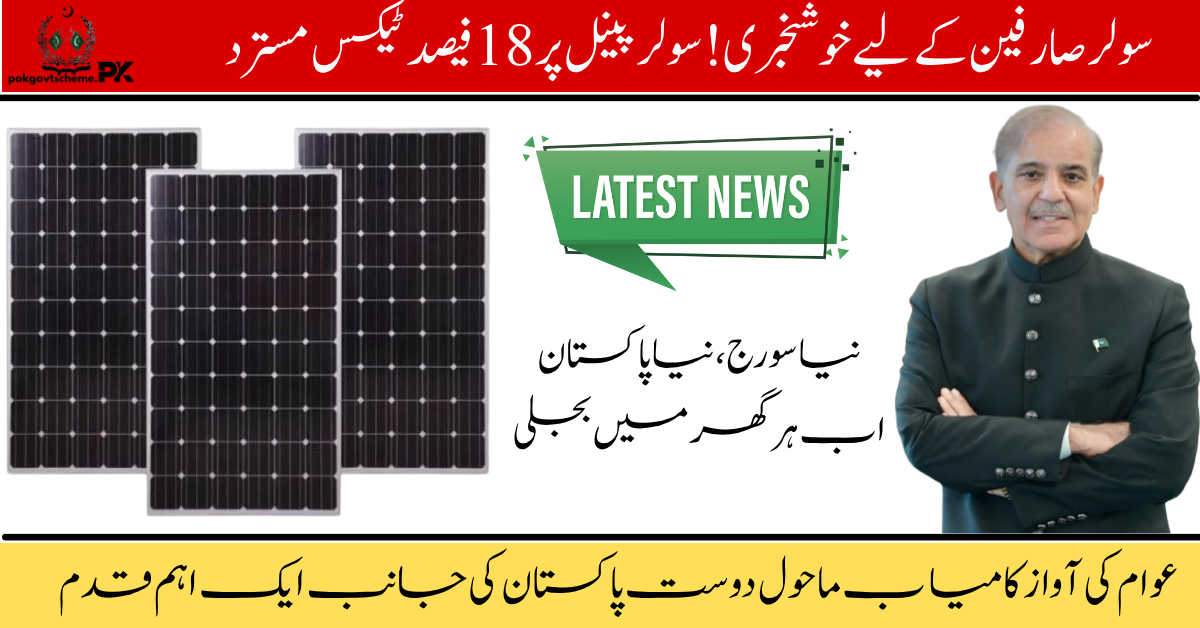Good News for people Govt rejected 18 percent solar panel tax
In a major relief for Pakistan’s green energy sector, the NA Committee rejected the 18% tax proposal on solar panel imports in 2025. This decision comes at a time when energy prices are rising and the country is struggling to meet electricity demands. The proposal, if passed, would have increased the cost of solar equipment and affected thousands of homes and businesses relying on renewable energy.
By rejecting solar panel tax, the National Assembly Committee has given a lifeline to clean energy growth in Pakistan. With power outages still common, solar power remains a popular solution for households, factories, and schools. Many had feared that this tax would slow down progress and hurt solar adoption rates.
Tax Rejected – What the Decision Really Means
The Federal Board of Revenue (FBR) had proposed a flat 18% General Sales Tax (GST) on all solar panel imports in 2025. This plan was part of broader revenue-raising efforts under IMF guidelines. However, the NA Standing Committee on Energy found this move unfair and short-sighted. They rejected the tax, stating it would block access to affordable solar energy for everyday Pakistanis.
The committee’s decision came after weeks of protests by solar companies, engineers, and civil society groups. Many experts explained that Pakistan needs more solar investment, not less. If the tax was approved, it could have raised the price of a basic home solar setup by nearly Rs. 70,000. That’s a heavy cost for middle-income families. Solar tax Pakistan 2025 had become a trending topic on social media, with hashtags like solar panel tax gaining traction.

Read More: Rs. 3.5 Billion Allocated for Minority Card – Budget 2025–26
Solar Power in Pakistan – Why It Needs Support, Not Taxes
Pakistan faces an energy crisis that’s not going away soon. With rising fuel prices and old power plants, solar energy has become one of the most trusted alternatives. Over 2 million homes in Pakistan now use solar panels to cut down on bills and reduce dependency on the unreliable grid.
Taxing solar panel imports would make clean energy harder to reach. That’s a step in the wrong direction. Experts at the Alternative Energy Development Board (AEDB) say Pakistan needs to produce 30% of its electricity through renewable energy by 2030. If solar becomes costly, that goal might never be reached. Right now, Pakistan imports most of its solar panels from China. Adding duty would slow the market and hit the small businesses that install and maintain these systems.
Key Stakeholders Who Blocked the Solar Panel Tax
The NA Energy Committee, led by Chairman Sardar Riaz Mazari, took a firm stand against solar panel tax. Several members, including representatives from Punjab and Sindh, argued that the tax would hurt the poor and small businesses the most. Many MPs said the proposal ignored ground realities, especially in areas where solar is the only reliable power source.
Renewable energy firms also played a strong role in stopping the solar panel tax. In a press conference in Lahore, CEO of SkyElectric, Mr. Aamer Hussain, warned that the tax could lead to job losses in the sector. Civil society organizations like the Pakistan Solar Association (PSA) shared data showing how demand would drop sharply if costs increased. Public pressure forced policymakers to reconsider.
Read More: CM Maryam Nawaz Dialysis Program – Full Guide 2025
Future of Solar in Pakistan After This Tax Rejection
Now that the NA Committee has rejected the 18% tax proposal on solar panel imports in 2025, solar projects are expected to grow. Analysts from the Energy Update Journal forecast a 20% increase in new residential and commercial installations over the next year. Confidence is high among local solar companies, and many are now planning expansions.
The government is also expected to launch new solar-friendly policies in the next fiscal year. These include easier net metering rules, subsidies for low-income households, and more investment in rural electrification. solar panel tax rejection has restored faith in Pakistan’s commitment to clean energy growth.
Here’s a comparison of solar prices with and without the tax:
| System Size | Cost Without Tax (Rs.) | Estimated Cost With Tax (Rs.) |
|---|---|---|
| 3kW Home Kit | 450,000 | 530,000 |
| 5kW Setup | 700,000 | 820,000 |
| 10kW Setup | 1,350,000 | 1,590,000 |
Read More: CM E-Taxi Scheme 2025 for Women – Full Details & Benefits
Could the Tax Return? What You Need to Watch
While this is a win for now, there’s no guarantee the tax won’t return. The FBR hasn’t dropped the proposal permanently. They may push it again during the next federal budget or under pressure from external lenders. The solar industry must stay alert and keep engaging with lawmakers.
In 2021, a similar duty was placed on wind turbine parts, only to be reversed after protests. That’s why experts warn that any delay in policy clarity could hurt investor confidence. If this happens, Pakistan might lose out on foreign partnerships in solar development. The lesson here is that public pressure and expert voices matter more than ever.
Read More: CM Punjab Dhee Rani Scheme 2025: 5,000 Weddings Approved – How to Apply
Final Thoughts:
The rejection of the 18% tax on solar panel imports in 2025 is a win for the people, for progress, and for the planet. It shows that good sense can still prevail when the stakes are high. Pakistan must continue to invest in green energy—not penalize it.
With the world moving toward sustainable power, Pakistan has a real chance to become a leader in solar innovation. But that future depends on smart policies, public awareness, and support for businesses that are driving the change. This decision by the NA Committee is a step in the right direction, and it must be protected.







